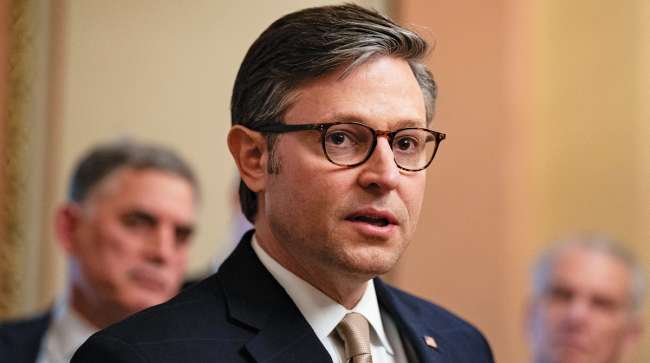“That was a big step,” Johnson said April 10, reacting to the chamber’s approval of the budget blueprint. (Al Drago/Bloomberg News)
President Donald Trump’s tax and budget agenda is one step closer toward realization after the House of Representatives agreed on a partisan legislative blueprint.
In a 216-214 vote on April 10, the Republican-led House adopted a comprehensive Senate-passed budget guidance resolution. The partisan vote, celebrated by most Republicans on Capitol Hill as well as the White House, officially opens the door for policy committees to begin drafting the president’s domestic priorities.
At a moment in which tensions tied to Trump’s tariffs threatened to delay Congress’ agenda, Speaker Mike Johnson (R-La.) expressed optimism. “That was a big step,” Johnson told reporters April 10, reacting to the chamber’s approval of the budget blueprint. “Because that will allow us now to move forward to have our committees actually drafting the one, big, beautiful bill. There’s a lot of work ahead of us. And we’re really excited about that.”
Following the House’s vote, the congressional policy committees, including the transportation panels, will be tasked with drafting pieces of what ultimately will become a procedural budget reconciliation bill. Republican congressional leaders intend to finalize the reconciliation measure — a bill that would require simple majorities in Congress for passage — prior to the Memorial Day recess.
Policies to be considered in this upcoming reconciliation bill include border security, military readiness, social safety net programs, domestic energy initiatives, supply chain connectivity and extending the Trump-era 2017 tax cuts. Specific to the GOP agenda, Senate Majority Leader John Thune (R-S.D.) on April 8 explained the budget bill “sets us up to do the things that we have on our agenda, along with President Trump, and that is to extend the Trump tax cuts, obviously to rebuild the military, restore American energy dominance, and secure our southern border — at the same time that we are saving money, finding ways to have the government operate in a less costly and more efficient way and attacking deficit reduction.”

Thune said the budget bill “sets us up to do the things that we have on our agenda.” (Allison Robbert/Bloomberg News)
The White House is committed to maintaining the Republicans’ legislative momentum. On April 10, it stated: “President Trump is calling on Congress to immediately ‘pass the one, big, beautiful bill’ and unleash a soaring economy, surging jobs market, manufacturing boom, and prosperity like never before. It’s time to get it done.”
Democrats governing in the minority remain opposed to Trump’s domestic proposals as well as recent action linked to tariffs and the economy. Sen. Chuck Schumer (D-N.Y.), that chamber’s minority leader, is leading the pushback of the budget reconciliation process. As he put it, “The bottom line is, sooner or later, Republicans are going to have to face the music. There aren’t enough procedural gimmicks in the world to change reality: the Republican agenda, on both sides — slashing programs like health care that people need, tax cuts for billionaires — it’s unpopular on both sides. It’s not going to get any more popular moving forward.
“And the Republicans,” Schumer continued, “will have to tie themselves in lots of pretzel knots to even get a bill passed.”
House Appropriations Committee ranking member Rep. Rosa DeLauro (D-Conn.) has taken aim at the GOP fiscal agenda. Reacting to announcements about potential reductions to disaster relief, she argued, “We are in the middle of a cost-of-living crisis, and Elon Musk and President Trump are making it worse. Instead of providing people with the disaster relief they were promised, Elon Musk and President Trump are threatening to steal those funds to cover their tax breaks for billionaires and big corporations.”
Separate from the budget reconciliation procedural process, congressional funding leaders, such as DeLauro, continue the consideration of fiscal 2026 priorities. Funding authority for the U.S. Department of Transportation and most other agencies expires on Oct. 1.






